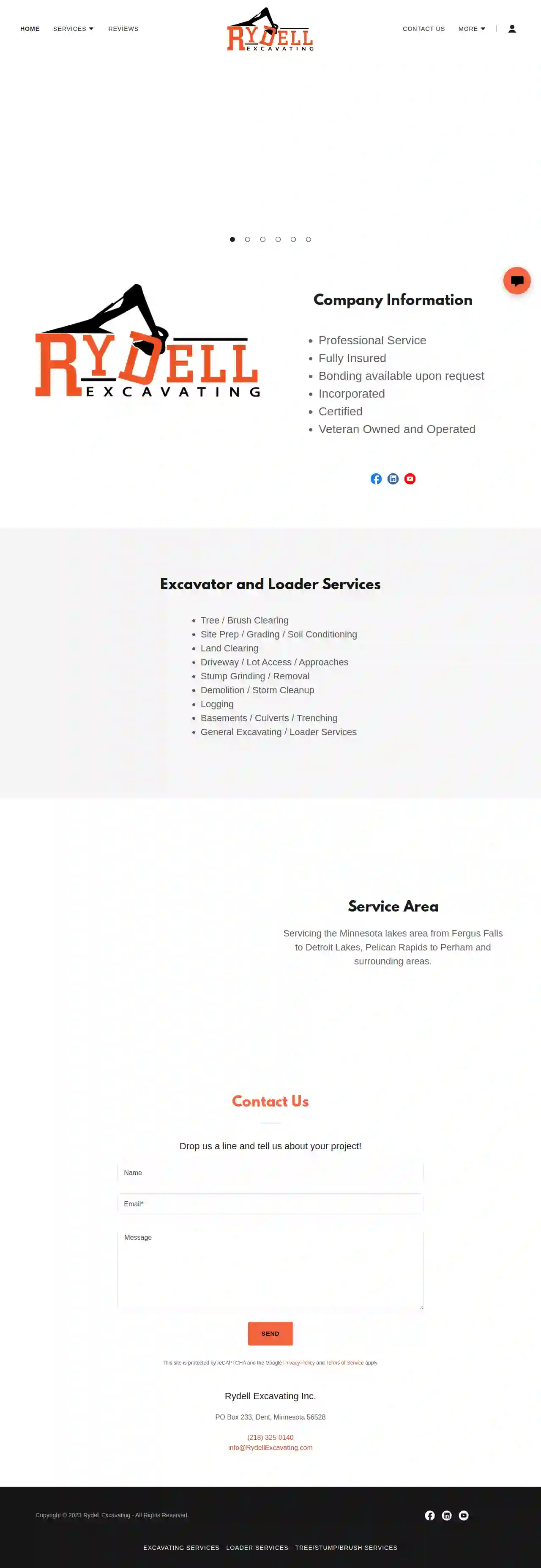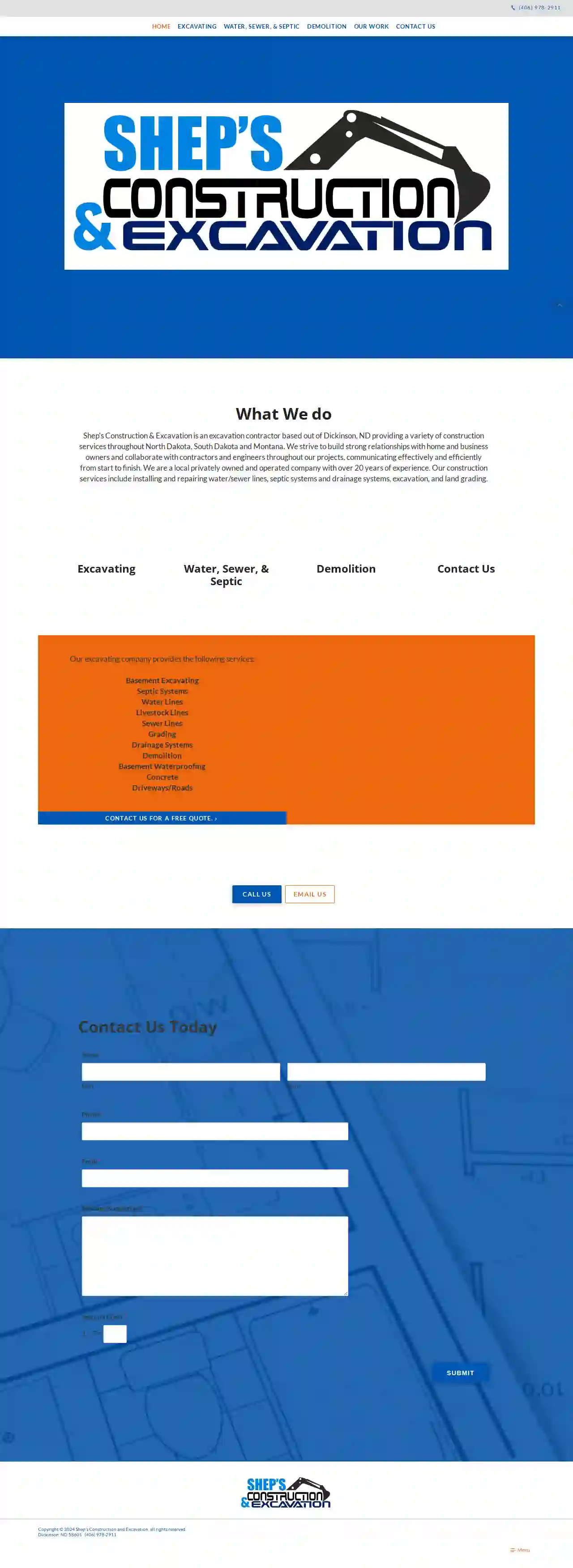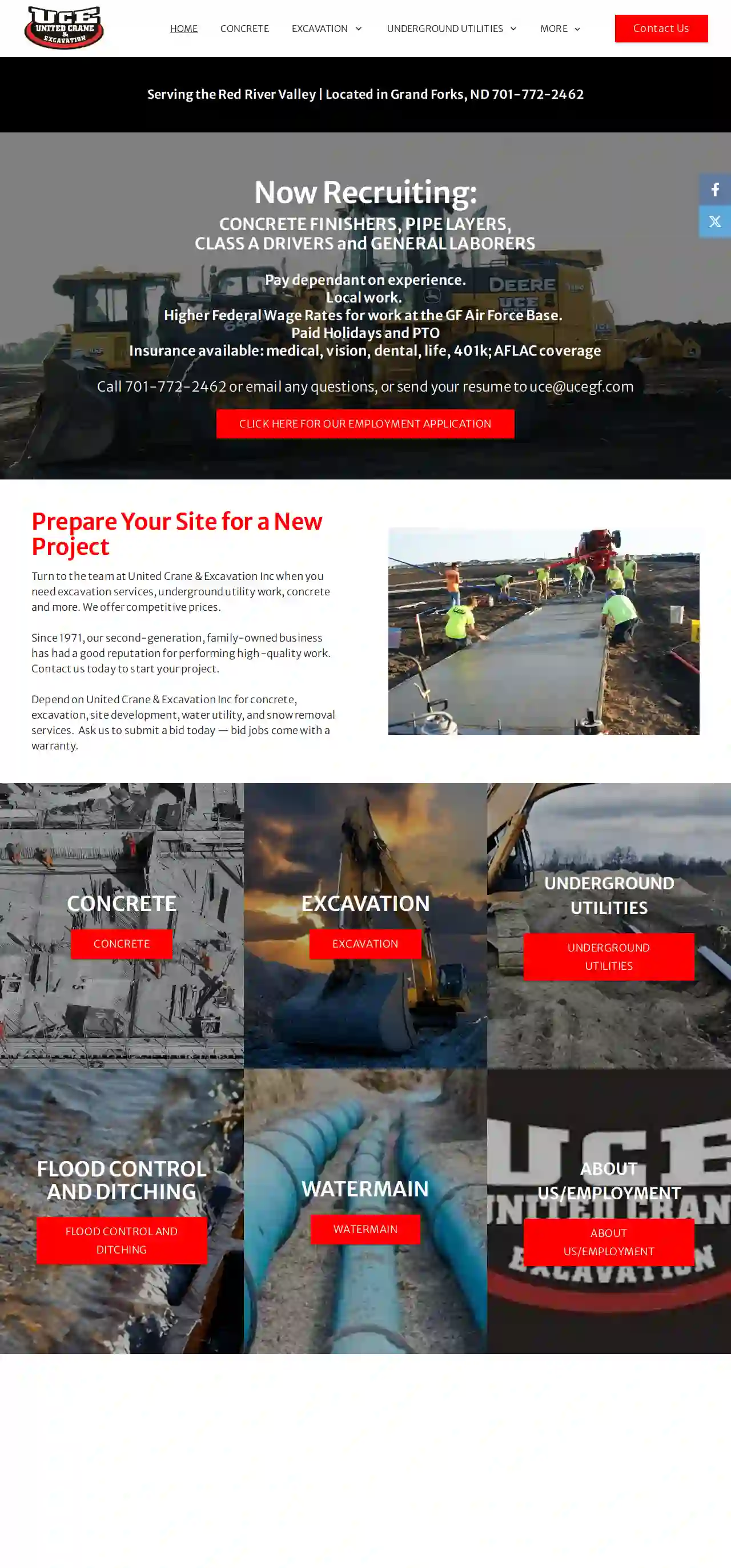Excavation Contractors North Dakota
Find the best Trenching Services in North Dakota
Receive 3 FREE Excavation Contractors Near Me quotes for your project today! Compare profiles, reviews, accreditations, portfolio, etc... and choose the best service.

Rydell Excavating
516 reviewsPO Box 233, Dent, 56528, USCompany Information Rydell Excavating is a professional excavating company serving the Minnesota lakes area. We are fully insured and bonding is available upon request. We are a veteran-owned and operated business, committed to providing high-quality services to our clients. Excavator and Loader Services We offer a wide range of excavating and loader services, including: Tree / Brush Clearing Site Prep / Grading / Soil Conditioning Land Clearing Driveway / Lot Access / Approaches Stump Grinding / Removal Demolition / Storm Cleanup Logging Basements / Culverts / Trenching General Excavating / Loader Services Service Area We service the Minnesota lakes area from Fergus Falls to Detroit Lakes, Pelican Rapids to Perham and surrounding areas.
- Services
- Why Us?
- Gallery
Get Quote
JCR Excavating LLC
1Williston, USCrafting Terrain Founded in 2007, JCR Excavating began as a dream, steadily evolving into one of the leading excavating companies in North Dakota. We’ve weathered economic downturns, expanded our operations, and built a tight-knit team of professionals. Dedicated to delivering impeccable workmanship, our rich history and hands-on leadership set us apart. Williston's Excavation Specialist At JCR Excavating, we integrate cutting-edge technologies to help us deliver precision results that match your project plans down to the last inch. By leveraging excavation software like Topcon GPS and John Deere 3D SmartGrade, we can dig to exact depths or grade to the perfect slope. With JCR, there’s no room for error. Comprehensive Excavation in Western North Dakota JCR Excavating proudly offers a range of excavating services, catering to the unique demands of Williston and its surrounding regions.
- Services
- Why Us?
- Gallery
Get Quote
Shep's Construction and Excavation
52 reviewsBismarck, US- Services
- Why Us?
Get Quote
United Crane & Excavation Inc
4.26 reviewsBismarck, US- Services
- Why Us?
Get Quote- Ki
Kioti Contracting | Excavation & Septic Service
11 reviewsBismarck, US- Services
- Why Us?
- Gallery
Get Quote
Over 3,943+ Excavation Pros registered
Our excavation contractors operate in North Dakota & surrounding areas!
ExcavationHQ has curated and vetted the Best Excavation Contractors in and around North Dakota. Find a reliable business today.
Frequently Asked Questions About Excavation Contractors
- Utility Locates: Contact your utility companies to mark the locations of underground lines before excavation begins. This is usually a free service.
- Hand Digging: Excavate carefully by hand near marked utility lines to avoid damage.
- Potholing: Digging small test holes to expose and verify utility depths and locations.
- Safe Distances: Maintaining a safe distance between excavation equipment and marked utility lines.
- Vacuum Excavation: Using vacuum excavation techniques to expose utilities without digging, reducing the risk of damage.
- Hauling to Designated Disposal Sites: Transporting excavated material to approved landfills or recycling centers.
- Recycling or Reuse: If suitable, some excavated soil might be recycled for other projects or reused on-site for landscaping or backfilling.
- Complying with Regulations: Adhering to local and environmental regulations for soil disposal to prevent contamination or illegal dumping.
- Project Size and Scope: The larger and more complex the excavation, the higher the cost.
- Soil Type: Different soil types require different equipment and techniques, impacting costs. Rocky or clay-rich soil can be more expensive to excavate than loose soil.
- Accessibility: Difficult-to-access sites might require specialized equipment or additional labor, increasing expenses.
- Disposal Costs: Hauling away excavated material (soil, rocks, etc.) to disposal sites incurs additional fees.
- Permits and Inspections: Depending on local regulations, permits and inspections might be required, adding to the overall cost.
How do you protect utilities during excavation?
How do you handle soil disposal after excavation?
How much does excavation cost?
What is the difference between excavation and grading?
Excavation: Primarily involves removing earth or other materials from a site. It's about digging down and creating space.
Grading: Focuses on shaping and leveling the ground to a specific slope or elevation. It's about adjusting the existing terrain.
For example, you might excavate a foundation and then grade the surrounding area to ensure proper drainage and a level surface for landscaping.
How do you protect utilities during excavation?
- Utility Locates: Contact your utility companies to mark the locations of underground lines before excavation begins. This is usually a free service.
- Hand Digging: Excavate carefully by hand near marked utility lines to avoid damage.
- Potholing: Digging small test holes to expose and verify utility depths and locations.
- Safe Distances: Maintaining a safe distance between excavation equipment and marked utility lines.
- Vacuum Excavation: Using vacuum excavation techniques to expose utilities without digging, reducing the risk of damage.
How do you handle soil disposal after excavation?
- Hauling to Designated Disposal Sites: Transporting excavated material to approved landfills or recycling centers.
- Recycling or Reuse: If suitable, some excavated soil might be recycled for other projects or reused on-site for landscaping or backfilling.
- Complying with Regulations: Adhering to local and environmental regulations for soil disposal to prevent contamination or illegal dumping.
How much does excavation cost?
- Project Size and Scope: The larger and more complex the excavation, the higher the cost.
- Soil Type: Different soil types require different equipment and techniques, impacting costs. Rocky or clay-rich soil can be more expensive to excavate than loose soil.
- Accessibility: Difficult-to-access sites might require specialized equipment or additional labor, increasing expenses.
- Disposal Costs: Hauling away excavated material (soil, rocks, etc.) to disposal sites incurs additional fees.
- Permits and Inspections: Depending on local regulations, permits and inspections might be required, adding to the overall cost.
What is the difference between excavation and grading?
Excavation: Primarily involves removing earth or other materials from a site. It's about digging down and creating space.
Grading: Focuses on shaping and leveling the ground to a specific slope or elevation. It's about adjusting the existing terrain.
For example, you might excavate a foundation and then grade the surrounding area to ensure proper drainage and a level surface for landscaping.